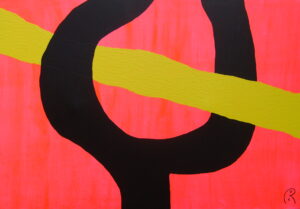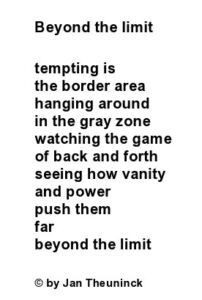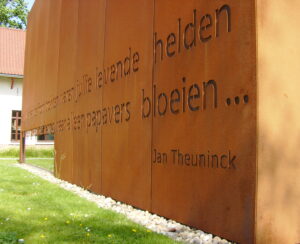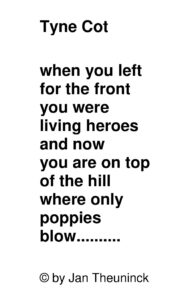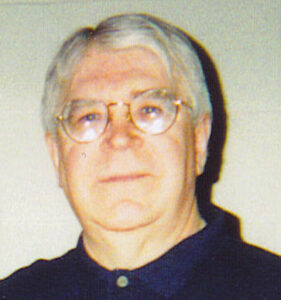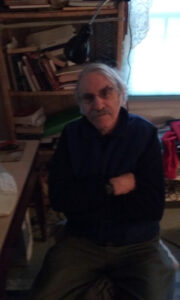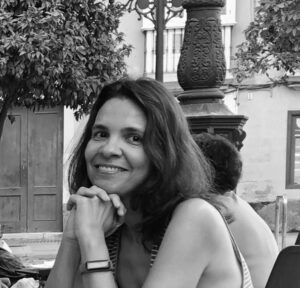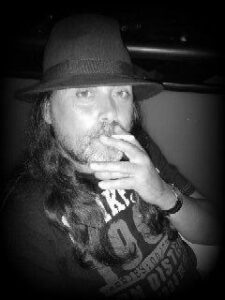On Line Blog
Living with the Elephant. A Poem by Cynthia Bernard
Living with the Elephant I guess the fog has little cat feet sometimes, but around here it dances with the wind, wild and fierce, especially at dawn. Howling across the ocean, up the hill, gusting my robe against me, sloshing coffee into my face as I try for a sip. I guess aging is gradual sometimes, but around here it’s a tempest, arising suddenly, wild and fierce and relentless. Wrenching my days apart into a before that can never be found again -- and a very different now. I guess one could fight it sometimes, hair color, face cream, supplements and potions, exercises, affirmations, denial. I guess one could simply accept it sometimes, but around here arthritis has swept in on elephant feet, fierce and relentless, and no pill, no potion, no affirmation, no meditation, can sweep it out again. I guess one could handle things gracefully and sometimes I do, but around here there are other times, too, when everything seems to hurt and I want to stay under a quilt for whatever part of forever I get to see. And then again, there are yet other times, sometimes, the majesty of the ocean at first light, the sweetness of love found late, my hand sliding into his. New buds on the camellia, rain on the roof, deer in the yard, granddaughter’s smile, or a nothing-special-time in the exquisiteness of the now. And I find that sometimes, increasingly often, I welcome it all: the cat’s feet and the elephant, things wild and fierce, quiet moments and raging ones, lines on my softening face, creaky joints and aching bones, wind in my hair, full heart, fog over the ocean at dawn. (This poem was originally published in Multiplicity Magazine)
Bio: Cynthia Bernard is a woman in her late 60’s who is finding her voice as a poet after many decades of silence. A long-time classroom teacher and a spiritual mentor, she lives and writes on a hill overlooking the ocean, about 20 miles south of San Francisco.
Publication history: Her poetry has been published in Multiplicity Magazine, The MockingOwl Roost, The Vita Brevis Press Poetry Anthology, Last Leaves Literary Magazine, Flora Fiction, fws: a journal of literature and art, and Open Door Magazine, and will appear in upcoming issues of Passager Journal and The Fresh Words Magazine Anthology: Contemporary Poems 2022.
Rilke, Brecht & Goethe, Translations from German poets by Michael R Burch
Komm, Du (“Come, You”) by Rainer Maria Rilke loose translation by Michael R. Burch This was Rilke’s last poem, written ten days before his death. He died open-eyed in the arms of his doctor on December 29, 1926, in the Valmont Sanatorium, of leukemia and its complications. I had a friend who died of leukemia and he was burning up with fever in the end. I believe that is what Rilke was describing here: he was literally burning alive. Come, you—the last one I acknowledge; return— incurable pain searing this physical mesh. As I burned in the spirit once, so now I burn with you; meanwhile, you consume my flesh. This wood that long resisted your embrace now nourishes you; I surrender to your fury as my gentleness mutates to hellish rage— uncaged, wild, primal, mindless, outré. Completely free, no longer future’s pawn, I clambered up this crazy pyre of pain, certain I’d never return—my heart’s reserves gone— to become death’s nameless victim, purged by flame. Now all I ever was must be denied. I left my memories of my past elsewhere. That life—my former life—remains outside. Inside, I’m lost. Nobody knows me here. Komm du Komm du, du letzter, den ich anerkenne, heilloser Schmerz im leiblichen Geweb: wie ich im Geiste brannte, sieh, ich brenne in dir; das Holz hat lange widerstrebt, der Flamme, die du loderst, zuzustimmen, nun aber nähr’ ich dich und brenn in dir. Mein hiesig Mildsein wird in deinem Grimmen ein Grimm der Hölle nicht von hier. Ganz rein, ganz planlos frei von Zukunft stieg ich auf des Leidens wirren Scheiterhaufen, so sicher nirgend Künftiges zu kaufen um dieses Herz, darin der Vorrat schwieg. Bin ich es noch, der da unkenntlich brennt? Erinnerungen reiß ich nicht herein. O Leben, Leben: Draußensein. Und ich in Lohe. Niemand der mich kennt. Liebes-Lied (“Love Song”) by Rainer Maria Rilke loose translation/interpretation by Michael R. Burch How can I withhold my soul so that it doesn’t touch yours? How can I lift mine gently to higher things, alone? Oh, I would gladly find something lost in the dark in that inert space that fails to resonate until you vibrate. There everything that moves us, draws us together like a bow enticing two taut strings to sing together with a simultaneous voice. Whose instrument are we becoming together? Whose, the hands that excite us? Ah, sweet song! Liebes-Lied Wie soll ich meine Seele halten, daß sie nicht an deine rührt? Wie soll ich sie hinheben über dich zu andern Dingen? Ach gerne möcht ich sie bei irgendwas Verlorenem im Dunkel unterbringen an einer fremden stillen Stelle, die nicht weiterschwingt, wenn deine Tiefen schwingen. Doch alles, was uns anrührt, dich und mich, nimmt uns zusammen wie ein Bogenstrich, der aus zwei Saiten eine Stimme zieht. Auf welches Instrument sind wir gespannt? Und welcher Geiger hat uns in der Hand? O süßes Lied. Das Lied des Bettlers (“The Beggar’s Song”) by Rainer Maria Rilke loose translation/interpretation by Michael R. Burch I live outside your gates, exposed to the rain, exposed to the sun; sometimes I’ll cradle my right ear in my right palm; then when I speak my voice sounds strange, alien ... I'm unsure whose voice I’m hearing: mine or yours. I implore a trifle; the poets cry for more. Sometimes I cover both eyes and my face disappears; there it lies heavy in my hands looking peaceful, unafraid, so that no one would ever think I have no place to lay my head. Das Lied des Bettlers Ich gehe immer von Tor zu Tor, verregnet und verbrannt; auf einmal leg ich mein rechtes Ohr in meine rechte Hand. Dann kommt mir meine Stimme vor, als hätt ich sie nie gekannt. Dann weiß ich nicht sicher, wer da schreit, ich oder irgendwer. Ich schreie um eine Kleinigkeit. Die Dichter schrein um mehr. Und endlich mach ich noch mein Gesicht mit beiden Augen zu; wie's dann in der Hand liegt mit seinem Gewicht sieht es fast aus wie Ruh. Damit sie nicht meinen ich hätte nicht, wohin ich mein Haupt tu.
BERTOLT BRECHT Die Bücherverbrennung (“The Burning of the Books”) by Bertolt Brecht loose translation/interpretation by Michael R. Burch When the Regime commanded the unlawful books to be burned, teams of dull oxen hauled huge cartloads to the bonfires. Then a banished writer, one of the best, scanning the list of excommunicated texts, became enraged: he’d been excluded! He rushed to his desk, full of contemptuous wrath, to write fiery letters to the incompetents in power — Burn me! he wrote with his blazing pen — Haven’t I always reported the truth? Now here you are, treating me like a liar! Burn me! Die Bücherverbrennung Als das Regime befahl, Bücher mit schädlichem Wissen Öffentlich zu verbrennen, und allenthalben Ochsen gezwungen wurden, Karren mit Büchern Zu den Scheiterhaufen zu ziehen, entdeckte Ein verjagter Dichter, einer der besten, die Liste der Verbrannten studierend, entsetzt, daß seine Bücher vergessen waren. Er eilte zum Schreibtisch Zornbeflügelt, und schrieb einen Brief an die Machthaber. Verbrennt mich! schrieb er mit fliegender Feder, verbrennt mich! Tut mir das nicht an! Laßt mich nicht übrig! Habe ich nicht Immer die Wahrheit berichtet in meinen Büchern? Und jetzt Werd ich von euch wie ein Lügner behandelt! Ich befehle euch: Verbrennt mich! Der Abschied (“The Parting”) by Bertolt Brecht loose translation/interpretation by Michael R. Burch We embrace; my fingers trace rich cloth while yours encounter only moth- eaten fabric. A quick hug: you were invited to the gay soiree while the minions of the "law" relentlessly pursue me. We talk about the weather and our eternal friendship's magic. Anything else would be too bitter, too tragic. Der Abschied Wir umarmen uns. Ich fasse reichen Stoff Du fassest armen. Die Umarmung ist schnell Du gehst zu einem Mahl Hinter mir sind die Schergen. Wir sprechen vom Wetter und von unserer Dauernden Freundschaft. Alles andere Wäre zu bitter Die Maske des Bösen (“The Mask of Evil”) by Bertolt Brecht loose translation/interpretation by Michael R. Burch A Japanese woodcarving hangs on my wall— the mask of an ancient demon, limned with golden lacquer. Not unsympathetically, I observe the forehead’s bulging veins, the tremendous strain such malevolence requires. Die Maske des Bösen An meiner Wand hängt ein japanisches Holzwerk Maske eines bösen Dämons, bemalt mit Goldlack. Mitfühlend sehe ich / Die geschwollenen Stirnadern, andeutend Wie anstrengend es ist, böse zu sein.
ON LOOKING AT SCHILLER’S SKULL by Johann Wolfgang von Goethe loose translation/interpretation by Michael R. Burch Here in this charnel-house full of bleaching bones, like yesteryear’s fading souvenirs, I see the skulls arranged in strange ordered rows. Who knows whose owners might have beheaded peers, packed tightly here despite once repellent hate? Here weaponless, they stand, in this gentled state. These arms and hands, they once were so delicate! How articulately they moved! Ah me! What athletes once paced about on these padded feet? Still there’s no hope of rest for you, lost souls! Deprived of graves, forced here like slaves to occupy this overworld, unlamented ghouls! Now who’s to know who loved one orb here detained? Except for me; reader, hear my plea: I know the grandeur of the mind it contained! Yes, and I know the impulse true love would stir here, where I stand in this alien land surrounded by these husks, like a treasurer! Even in this cold, in this dust and mould I am startled by a strange, ancient reverie, ... as if this shrine to death could quicken me! One shape out of the past keeps calling me with its mystery! Still retaining its former angelic grace! And at that ecstatic sight, I am back at sea ... Swept by that current to where immortals race. O secret vessel, you gave Life its truth. It falls on me now to recall your expressive face. I turn away, abashed here by what I see: this mould was worth more than all the earth. Let me breathe fresh air and let my wild thoughts run free! What is there better in this dark Life than he who gives us a sense of man’s divinity, of his place in the universe? A man who’s both flesh and spirit—living verse!
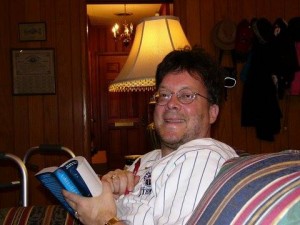
Michael R. Burch is an American poet who lives in Nashville, Tennessee with his wife Beth and two incredibly spoiled puppies. He has over 6,000 publications, including poems that have gone viral. His poems, translations, essays, articles, letters, epigrams, jokes and puns have been published by TIME, USA Today, BBC Radio 3, Writer’s Digest–The Year’s Best Writing and hundreds of literary journals. His poetry has been translated into 14 languages, taught in high schools and colleges, and set to music by 23 composers, including two potential operas if the money ever materializes. He also edits www.thehypertexts.com, has served as editor of international poetry and translations for Better Than Starbucks, is on the board of Borderless Journal, an international literary journal, and has judged a number of poetry contests over the years.
THROUGH A FOG, AFTER THE FALL & WISDOM. 3 Poems by George Freek
THROUGH A FOG (After Su Tung Po) Wind rustles the leaves with rough fingers, then blows away. Silence is a muted scream. Clouds look at nothing when they pass by like men who no longer ask why. The moon, once so bright, is a dim light in that immense sea, while I search for things that are not to be. AFTER THE FALL (After Mei Yao Chen) Dying flowers lie like corpses with discolored heads. If my wife were here, She’d try to revive them, but she’s also dead. Night holds me in its arms, as if I were a child, abandoned in a desolate spot. Stars crawl across the sky like bugs wandering lost and blind, over an infinite rug, Life is unkind. Life will never be how it was, but I think the way it was was only in my mind WISDOM (After Tu Fu) I stare at my unmade bed. Outside, a chilling breeze rustles the dead leaves, as if they were feathers. The moon is a ball of lead. I gaze at distant stars, lost in the infinite sky, as if they had nowhere to abide. A torn shirt, hanging from a tree, waves in the breeze, like an abandoned flag, now a tattered rag. I feel the approaching cold. I watch traffic pass me by, as if I were a stone. I’ve learned what it means to become old.
George Freek’s poem “Written At Blue Lake” was nominated for a Pushcart Prize. His poem “Enigmatic Variations” was also recently nominated for Best of the Net. His collection “Melancholia” is published by Red Wolf Editions.
Marie. A Poem by Jack D. Harvey
Marie
Oh Marie, you are
an aging wreck;
your dangling dugs,
your languid wrinkled Miss Muffet
won't bring the milkman early;
dirty and smelly
slattern of the month,
the epitome of
everybody's discarded laundry.
Lapses in motor function
mental focus
get you to the streetcar
late every day
and late to work;
booted out
sooner or later
when you get home
what will he say?
What a burden
for our pity and revulsion;
you're frightening
in your squalor.
Night and day
a dead soul
an endless round
of apathy and despair,
what kind of life is that?
That's what we think.
But some rare times,
God knows why
somehow roused,
triumphant
between the bed posts
like a shaky marionette
you rise and fall
to the challenge
of bleary marital bliss;
for those few moments
assertive queen,
sweating with your
hirsute timorous king
dismantling him,
cannibalizing him,
you burst forth new-made,
king and queen together,
amorous two-backed beast
before your reign fades away
in the glimmer of tomorrow
and you come apart,
Priapic darling,
again become
what you were.
Alas, Marie, time's more
than a placeholder;
eater, destroyer
changing Nineveh
and all of us to dust;
false fellow traveler
rubbing us out
of our space and place
before we know it.
Jack D. Harvey’s poetry has appeared in Scrivener, The Comstock Review, Valparaiso Poetry Review, Poetry Life & Times, Typishly Literary Magazine, The Antioch Review, The Piedmont Poetry Journal and elsewhere. The author has been a Pushcart nominee and over the years has been published in a few anthologies.
The author has been writing poetry since he was sixteen and lives in a small town near Albany, New York. He is retired from doing whatever he was doing before he retired.
His book, Mark the Dwarf is available on Kindle. https://www.amazon.com/Mark the Dwarf Jack D.Harvey Ebook
Six Poems from EL PLAZO (THE DEADLINE) by Olga Muñoz. Translated by Amparo Arrospide and Robin Ouzman Hislop
Six poems from EL PLAZO (THE DEADLINE)
16.
Desapareceríamos todos si las abejas murieran. Por ahora somos cuatro: dos adultos y dos crías que cargar en brazos en caso necesario. Pronostican una marcha tranquila, aunque el zumbido nos alcance en las próximas jornadas. Como alimento llevamos la oscura miel de la familia, indigesta, dulzona. Los nuevos evitamos derramarla, ya que una gota perdida trae la maldición de confundir las criaturas propias. Sin olerla llegó el animalillo de nombre equivocado, en medio del camino.
16.
Were bees to die, we would all disappear. Right now we are just four: two adults and two cubs to carry in our arms if necessary. In spite of the buzz reaching us in the next few days, a peaceful march is predicted. We carry as food for the family our dark sickly sweet indigestible honey. As the newly arrived we take care not to spill a drop as a drop lost would curse us into confusing our own offspring. Not smelling the honey, a little animal with a wrong name appeared into the middle of the road.
17.
Volvemos a casa con la cría y el espacio se ha hecho redondo. Las elásticas paredes ceden a nuestras voces. Parece que el hueco estaba listo desde hace meses, pues cada objeto ocupa su espacio densamente. Sólo a la llegada nos percatamos. Despacio penetramos el aire, conseguimos traspasarlo para cobijar a los nuestros.
17. We return home with the cub into a space that has become round. The elastic walls recede with our voices. It seems the vacuity had been prepared for months, as each object occupies its own dense space. Only after arrival do we realize it as we slowly penetrate the air and manage to cross it to find a shelter for our own.
18.
No rodará, no caerá al vacío. No lo abrazará el aire, continente escueto al principio, península improvisada, isla final. Como en los trucos de magia, existen hilos invisibles, saliva que me ata a tres cuerpos y hace de mí una marioneta ciega.
18.
It will not roll nor fall into a void nor embrace the air, a bare continent at the beginning, an improvised peninsula, an island at the end. As with tricks of magic, invisible threads exist, saliva that ties me to three bodies like a blind marionette.
19.
Cada uno aguarda su turno para respirar. No nos vemos siquiera. Ocupamos salas de cristal con cuerpos transparentes, reflejados al azar. La gran mentira, el espejismo del aire. Mientras, las crías dormitan en la madriguera, repleta de oxígeno su sangre recién nacida.
19.
We each wait for our turn to breathe. We can’t even see each other. Our transparent bodies occupy glass rooms, randomly reflected. The mirage of air, a great lie. Meanwhile, the cubs are dozing snuggled close, their newborn blood full of oxygen.
20.
Escucha a su madre leer un cuento, la historia que lo espera al otro lado. Aún lo separan unos centímetros del designio. Un jabalí descompuesto en el bosque recuerda a ese niño alumbrado a la muerte. El deseo repetido de luna en luna, la tristeza rojiza del vacío. Mujer estéril que sueña al hijo con solo apartar la mano a tiempo.
20.
He listens as his mother reads a story, a story that waits for him from the other side. Yet still a few centimeters separate him from his fate. A rotting boar in the forest resembles the birth of the child born to death. The same desire passed from moon to moon, the reddish sadness of emptiness. A barren woman who dreams her son with only the withdrawal of her hand on time.
21.
Encontraste el sedal entre la arena, lejos del lugar del sacrificio. Casi caíste, y con todo tu cuerpo –uñas, árbol, océano– preguntabas qué era ese hilo. Te dimos palabras precisas, las más adecuadas seguramente. Nos pierde la exactitud. Aún así, siguen muriendo los peces de asfixia, con ese mismo sedal de tus dedos.
21.
You found the fishing line in the sand, far from the place of sacrifice. You almost fell down, and with your whole body – nails, tree, ocean – asked what was that thread. We replied with precise words, surely the most adequate. Exactitude is our undoing. But still fish continue to die of suffocation, with that same thread from your fingers.
Olga Muñoz Carrasco is author of the books: La caja de música (Madrid, Fundación Inquietudes/Asociación Poética Caudal, 2011), El plazo (Madrid, Amargord, 2012), Cada palabra una ceniza blanca (Valencia, Ejemplar Único, 2013), Cráter, danza (Barcelona, Calambur, 2016), 15 Filos (Madrid, Cartonera del escorpión azul, 2021), Tapiz rojo con pájaros (Madrid, Bala Perdida, 2021) and Filo (unpublished). Her editorial work is linked to the Genialogías collection at the Tigres de Papel publishing house and the Lengua de Agua collective. She completed her doctoral studies in Philology in Madrid, USA and Peru, and is currently a professor and researcher at Saint Louis University (Madrid Campus). In Lima she published her monograph Sigiloso desvelo- The poetry of Blanca Varela (Pontifical Catholic University of Peru, 2007). She prepared Blanca Varela’s anthology Y todo debe ser mentira (Barcelona, Galaxia Gutenberg, 2020) and in France she has just published her study Palabras para un canto. La escritura en espiral de Blanca Varela (Paris, Belin Éducation/Humensis, 2022). In recent years, her works have appeared in the field of Spanish-American and Spanish poetry. She is part of the research project “El impacto de la guerra civil española en la vida intelectual de Hispanoamérica” (“The impact of the Spanish civil war on the intellectual life of Latin America”) , which led to her book Perú y la guerra civil española. La voz de los intelecturales (Madrid, Calambur, 2013). She also teaches at the José Hierro Foundation (Madrid) and at the Diploma Course on Appreciation and Poetic Studies, Caracas (Venezuela).
Amparo Arróspide (born in Buenos Aires) is an M.Phil. by the University of Salford. As well as poems, short stories and articles on literature and films in anthologies and international magazines, she has published five poetry collections: Presencia en el Misterio, Mosaicos bajo la hiedra, Alucinación en dos actos y algunos poemas, Pañuelos de usar y tirar and En el oído del viento. The latter is part of a trilogy together with Jacuzzi and Hormigas en diaspora, which are in the course of being published. In 2010 she acted as a co-editor of webzine Poetry Life Times, where many of her translations of Spanish poems have appeared, she has translated authors such as Margaret Atwood, Stevie Smith and James Stephens into Spanish, and others such as Guadalupe Grande, Ángel Minaya, Francisca Aguirre, Carmen Crespo, Javier Díaz Gil into English. She takes part in poetry festivals, recently Centro de Poesía José Hierro (Getafe).
Robin Ouzman Hislop is Editor of Poetry Life and Times his publications include All the Babble of the Souk and Cartoon Molecules collected poems and Key of Mist the recently published Tesserae translations from Spanish poets Guadalupe Grande and Carmen Crespo visit Aquillrelle.com/Author Robin Ouzman Hislop about author. See Robin performing his work Performance (University of Leeds) .
The would-be sculptor of muses. A Poem by Fabrice B. Poussin
The would-be sculptor of muses Ether comes to be in the bright light it makes auras like so many living hosts to chase the others as if to mate. In awe of the unknown phenomenon the maker of miracles seeks a solution to make a wonder from such soft chaos. A silent symphony emerges in a waltz particles of a curious matter embrace swirling in a gentle cyclone. Pondering the unexpected spectacle magician in his dreams he is still waiting for the only moment in time. Perhaps then he will be the great master holder of the secret he has been seeking when at last the creation becomes his muse.

Fabrice B. Poussin teaches French and English at Shorter University. Author of novels and poetry, his work has appeared in Kestrel, Symposium, The Chimes, and many other magazines. His photography has been published in The Front Porch Review, the San Pedro River Review as well as other publications. Most recently, his collection “In Absentia,” was published in August 2021 with Silver Bow Publishing.
Robin Ouzman Hislop is Editor of Poetry Life and Times at Artvilla.com ; You may visit Aquillrelle.com/Author Robin Ouzman Hislop about author & https://poetrylifeandtimes.com See Robin performing his work Performance (University of Leeds)
MOURNING DAD & Poems by Strider Marcus Jones
MOURNING DAD he is decomposed from a bramble rose now- his thorns of storms drow, foetal curled in the underworld faerie peat without plough. is it fun with all those comical musical jacketed jesters- or primplum suitedrun by posh ancestors- doing the same this and that to keep your spirit level flat with docile protestors wired to silicon investors. i bought this new fedora hat in whitewashed Mijas to be my own brown Romany see as- let them face their ignominy when i wear it here in town- like an un-shoed horse from the roadgorse prancing right through their moral less light brim slanted defiantly down eyes outsider brown. is it no Left or Right there. do you have your chair to sit in. can you smoke your pipe gathering stars in its clouds at night thinking thoughts in nothing. do you still use words to help wingless birds or is it silent to the violent fermenting fear when the truth comes near just like here. THROUGH TALL WINDOWS in late afternoon meadows low light sketched your shadows in Mucha pose while I watched through tall windows. opening doors footsteps on floors all the clocks in the house stopped in the sundial of your smile- then prying phones became postponed and dissolved the blocks of being drones in dosed apartments opening closed compartments. more Bogart and Bacall in Key Largo, or The Poet by Vettriano- in the hall, we took Hopper’s painting off the wall with its stark stress heart of darkness. Us we are composed out of the fate of stars a light dark light so old and tuned that regards most of Us as Other peasants who are clothed without privileged presents to burn wood in cracked stoves under crumbling cover. stitched to Their time we entwine in our own interpretation of this spinning station. only burlesque bright skies and the iris flowers of abandoned eyes can change the fixed views of a selfish landscape into united hues of equal state. our reality is broken- we are the hosts and ghosts who have been stolen the violated tokens of corporatist totems screen greed being traded and invaded then beaten for protesting by police working for the Thief. BABYLON'S BOHEMIAN BOUQUET i like the way some words you say go against gravity and linger in the air when you've gone. sad or fair, they blow away this dungeons dark oblivion, and water me with wisdom like a soft shawl with scents and sounds that i wrap around my senses come what may- you give it all, and love abounds in Babylon's bohemian bouquet. like butterflies in druid grey skies, the fragility of eternity ripples with uncertainty, but doesn't woo, then waver in your eyes. it's steady gaze seduces praise, then fondles and savours loves succulent flavours, like innocent alibis.
Strider Marcus Jones – is a poet, law graduate and former civil servant from Salford, England with proud Celtic roots in Ireland and Wales. A member of The Poetry Society, his five published books of poetry https://stridermarcusjonespoetry.wordpress.com/ reveal a maverick, moving between cities, playing his saxophone in smoky rooms. He is also the founder, editor and publisher of Lothlorien Poetry Journal https://lothlorienpoetryjournal.blogspot.com/
His poetry has been published in the USA, Canada, Australia, England, Scotland, Ireland, Wales, France, Spain, Germany; Serbia; India and Switzerland in numerous publications including: Dreich Magazine; The Racket Journal; Trouvaille Review; dyst Literary Journal; A New Ulster; Impspired Magazine; Literary Yard Journal; Piker Press; oppy Road Review; Cajun Mutt Press; Rusty Truck Magazine; Rye Whiskey Review; Deep Water Literary Journal; The Huffington Post USA; The Stray Branch Literary Magazine; Crack The Spine Literary Magazine; The Lampeter Review; Panoplyzine Poetry Magazine; Dissident Voice.
Robin Ouzman Hislop is Editor of Poetry Life and Times at Artvilla.com ; You may visit Aquillrelle.com/Author Robin Ouzman Hislop about author & https://poetrylifeandtimes.com See Robin performing his work Performance (University of Leeds)

